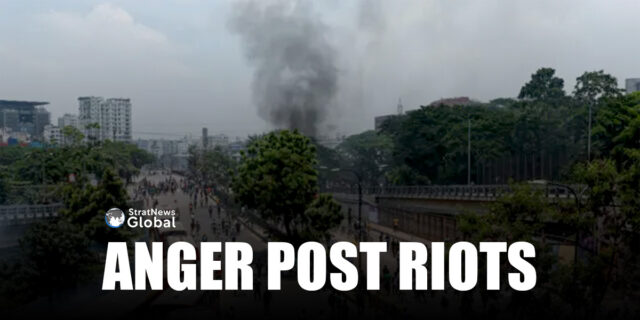Bangladesh Prime Minister Sheikh Hasina imposed a nationwide curfew last week and used the army to quell protests against job quotas that killed nearly 150 people, but anger against her government does not seem to have abated.
The protests, which started in universities and colleges earlier this month, quickly turned into a more widespread agitation against Hasina and her government.
Police fired rubber bullets, tear gas and lobbed sound grenades to disperse tens of thousands of protesters who came out on the streets. The government denied any live rounds were fired, but hospital sources said dead and injured people had wounds from bullets and shot gun pellets.
Rights groups and critics in Bangladesh, say Hasina has become increasingly autocratic during her last 15 years in power and her rule has been marked by mass arrests of political opponents and activists, forced disappearances and extrajudicial killings, charges she denies.
Badiul Alam Majumdar, the secretary of Shushahoner Jonno Nagorik, a Dhaka-based civil society platform for good governance, said the protests were “just the tip of the iceberg” and the use of force against students will breed further discontent against Hasina’s government.
“People are being deprived of their basic rights, with a significant lack of human rights and justice. They can’t cast their votes freely,” he said. “This widespread frustration and anger among the people is evident in the protests.”
Government official were not immediately available for comment. But officials have said previously no students were involved in arson or violence, and instead blamed opposition parties.
Hasina, 76, first led her Awami League party to victory in elections in 1996, serving one five-year term before regaining power in 2009, never to lose again.
She won a fourth straight term in office in January elections that were boycotted by the main opposition party and also marred by deadly protests.
While Hasina managed to overcome discontent and return the country towards some normalcy this week, it will not be “business as usual” going forward, said Zafar Sobhan, the editor of English daily Dhaka Tribune.
“This crisis shows that the government needs to listen to the young people of the country and take their concerns seriously,” said Sobhan, adding that the quota issue served as a proxy for several other key issues.
“The government has been put on notice that enough is enough and it needs to address the legitimate concerns of the public,” he said.
With Reuters inputs
Thirty eight years in journalism, widely travelled, history buff with a preference for Old Monk Rum. Current interest/focus spans China, Technology and Trade. Recent reads: Steven Colls Directorate S and Alexander Frater's Chasing the Monsoon. Netflix/Prime video junkie. Loves animal videos on Facebook. Reluctant tweeter.





